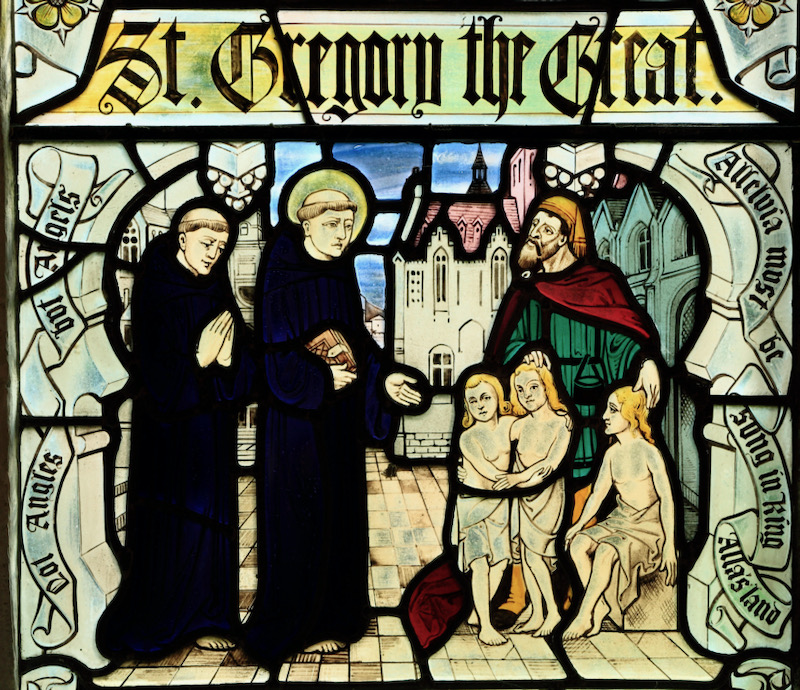On September 3 each year the Church celebrates the Feast of Pope St Gregory, one of only two Successors of St Peter to have been accorded the epithet The Great – despite more recent orchestrated efforts to champion Santo Subito John Paul II. As you surely know, it was Gregory the Great who sent the St Augustine and his 40 companion monks to convert the English in AD 597. The story told by the Venerable Bede concerning the future Pope’s inspiration for their mission is well-known. Seeing some fair-haired boys in the slave-market at Rome and hearing that they were Angles, Gregory quipped that their angelic faces marked them out as worthy of saving from divine wrath, so that they might end up singing Alleluias. (Bede, of course, finds it unremarkable that there should be a slave-market in Rome or that a future Pope should visit it, but that is another story ...)
There are two problems with the proposition that St Augustine converted the English, one historical and one pastoral. In the first place, the English scarcely existed at the time. It was to the court of King Ethelbert of Kent and his Christian wife, Bertha, that Augustine went. In fact, Ian Hislop argues, in his recent radio series, The Union. The Ghost Kingdoms of England (BBC Radio 4 – still available on BBC Sounds), that it was the process begun by St Augustine’s mission which created the English, to the extent that Gregory the Great became the unintentional Father of the nation. Association with Rome – with the imperial myth as much as with the ecclesiastical reality – lent legitimacy to the monarchs of England’s competing Kingdoms. The Roman Rite gave coherence to their disparate fiefdoms. The Church became the cement holding together the Gens Anglorum. It’s a strange turning of the tables on the notion that Augustine converted the English. Rather, Rome-inspired conversion created the English; and it began in Kent.
So much for the historical issues surrounding the claim. However, from a theological perspective, the more worrisome aspect of the statement is the placing of conversion as a one-off event in the distant past of the nation. There’s no denying that he and his fellow monks had substantial success – a success still visible today in the soaring lines of Canterbury Cathedral. The misfortune is that, ever since AD 597, conversion has typically been understood in the national narrative as a once-and-for-all event; more a matter of a community’s changing of world-view than a personal owning of that new belief and new loyalty to Christ.The pagan tribes simply shed their foolish ignorant beliefs and professed true religion: job done. England thus became a Christian Nation.
In traditional societies, it is hard to tell where conformity ends and personal faith begins. There is little scope for private opinion and decision. These categories are displaced by a shared conviction imbibed with the mother’s milk, a belief which requires neither reflection nor perfection on the part of every individual (although the worldview gains its power from the minority who do fully engage in the pursuit of holiness and the practice of charity).
But Christendom has long since sundered. Our culture has become increasingly secularised. Perhaps for a little longer we can expect the claim, “This is a Christian country,” to be trotted out from time to time, typically among those who never darken the doors of a church but merely wish to baptise their own resistance to change. For our own reasons – partly as a result of past persecution, partly as a fruit of past migration – the UK’s Roman Catholics have also remained wedded to the notion that faith is a group-thing, a largely passive acceptance of a particular world-view and of a series of regulations and explanations, bolstered by the assurance that school and parish would supply what personal faith could not.
But that game is over now. Maybe we’ll look back in future years on the Covid-induced suspension of The Sunday Obligation as some totemic moment in the shift from corporate obedience to a personal convicted faith. Catholics were finally officially told last year that skipping Sunday mass did not itself imperil their immortal souls. Thereafter, better reasons would have to be found for throwing off the bedclothes on a winter Sunday morning and heading down to the 9am at St Gertrude’s.
Reasons such as these: the realisation that conversion is a process which begins again each day on waking; Vatican II’s realisation that “it is Christ who speaks when the Sacred Scriptures are read in Church”; awareness that he himself gazes compassionately on our lostness and calls to us, “Come and have breakfast”; and that when we recognise him in the breaking of the bread this encounter sends us running home as witnesses to our friends and neighbours. Very late in the day, far too late, we are waking to this deeper take on living the Gospel and are inviting our communities to own it, confident that our conversion – both individual and national – lies more in the future than in the paSt
My hunch is that in this, as in much else in life, some sort of 80:20 rule applies. Maybe a fifth of our parishioners get it, with the other 80 per cent stuck in old models of habit, conformity and inherited belief. I say this not as a criticism of the 80%, but from concern. Their faith, as beautiful as it is fragile, leaves them ill-equipped to live the Gospel in a fractured world of faiths and unbelief, especially as the capacity of clergy to be the fulcrum of parish life is stretched ever further.
Gregory reassured Augustine and his companions when they would rather have turned back: “Do not be deterred by the troubles of the journey or by what men say … I hope to share in your joyful reward. God keep you safe.” May the prayers and witness of the Servant of the Servants of God keep us faithful to our task today.
Fr. Rob Esdaile is parish priest of Our Lady of Lourdes, Thames Ditton



 Loading ...
Loading ...
What do you think?
You can post as a subscriber user ...
User comments (0)